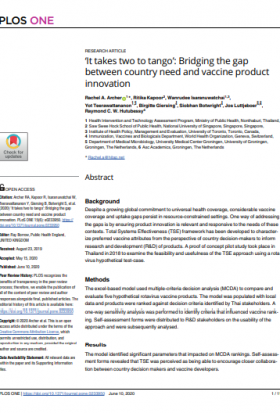This website uses cookies so that we can provide you with the best user experience possible. Cookie information is stored in your browser and performs functions such as recognising you when you return to our website and helping our team to understand which sections of the website you find most interesting and useful.
‘It takes two to tango’: Bridging the gap between country need and vaccine product innovation

รายละเอียดเพิ่มเติม
Abstract
Background
Despite a growing global commitment to universal health coverage, considerable vaccine coverage and uptake gaps persist in resource-constrained settings. One way of addressing the gaps is by ensuring product innovation is relevant and responsive to the needs of these contexts. Total Systems Effectiveness (TSE) framework has been developed to characterize preferred vaccine attributes from the perspective of country decision-makers to inform research and development (R&D) of products. A proof of concept pilot study took place in Thailand in 2018 to examine the feasibility and usefulness of the TSE approach using a rotavirus hypothetical test-case.
Methods
The excel-based model used multiple-criteria decision analysis (MCDA) to compare and evaluate five hypothetical rotavirus vaccine products. The model was populated with local data and products were ranked against decision criteria identified by Thai stakeholders. A one-way sensitivity analysis was performed to identify criteria that influenced vaccine ranking. Self-assessment forms were distributed to R&D stakeholders on the usability of the
approach and were subsequently analysed.
Results
The model identified significant parameters that impacted on MCDA rankings. Self-assessment forms revealed that TSE was perceived as being able to encourage closer collaboration between country decision makers and vaccine developers.




